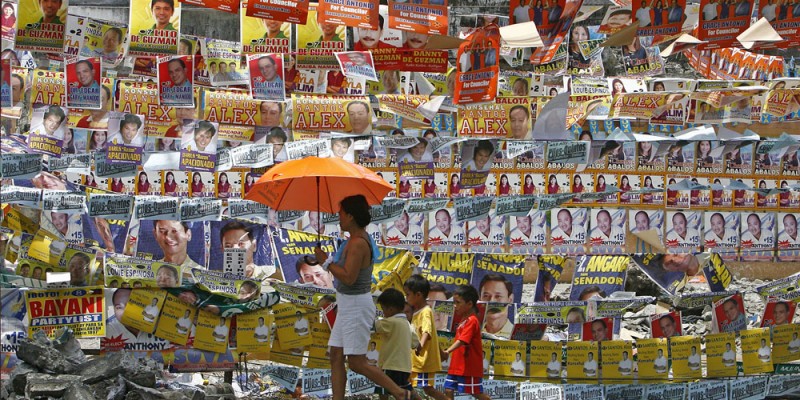Crucial reforms at stake in Monday’s polls

Election posters of national and local candidates fill a vacant lot along Shaw Boulevard, Mandaluyong City. INQUIRER/RAFFY LERMA
MANILA, Philippines—The Philippines holds elections on Monday seen as crucial to President Benigno Aquino’s efforts to transform society, but with deadly violence, corruption, and nepotism posing familiar threats.
More than 18,000 positions will be contested in the mid-term elections — from the town level up to the nation’s Congress — and Aquino is banking on landslide wins for his allies to cement his reform agenda.
“The President needs to be able to have a strong coalition in both houses of Congress to be able to push through critical measures,” Budget Secretary and ruling Liberal Party powerbroker Florencio Abad told Agence France-Presse.
Since taking office in 2010 following a landslide election win, Aquino has maintained record high popularity ratings while overseeing strong economic growth and efforts to tackle corruption that have won international acclaim.
In the Philippines, presidents can only serve one term of six years, and Aquino has said he is determined to leave a permanent legacy that will ensure the Philippines is no longer the “sick man of Asia”.
Article continues after this advertisementOne key plank is ending a decades-long Muslim rebellion in the south of the country that has claimed an estimated 150,000 lives and stifled economic growth.
Article continues after this advertisementAquino is close to signing a peace deal with the Moro Islamic Liberation Front, the main rebel group, but he will then need Congress to endorse the pact.
All the seats in the lower house and half in the Senate are being contested in the mid-term elections.
The Philippines has a plethora of parties, and politicians frequently shift allegiances, so controlling Congress is extremely difficult.
But Aquino secured support for key reform initiatives in his first three years in office, and he is confident that big victories in both chambers on Monday will ensure an even more productive second half of his term.
Abad said other initiatives that Aquino was eyeing over the next three years included expanding the tax base to pay for a better social safety net, and reform of the mining sector so that big firms pay higher taxes.
However, deep-rooted problems that have plagued the Philippines for decades are expected to again impact Monday’s election, and continue to haunt the political landscape long after Aquino has left office.
The Philippines is infamous for a brutal brand of democracy where politicians — particularly at the local and provincial levels — are willing to bribe, intimidate or kill to ensure they win.
More than 50 people have already been killed in election-related violence, including candidates and their aides. Philippine military and police will be on high alert Monday in a bid to stamp out any last-minute attacks.
Efforts by the Commission on Elections to curb violence and vote-buying turned into farce in the final days of campaigning, when the Supreme Court blocked the commission from enforcing controversial bans on selling alcohol and carrying large amounts of money.
Activists have warned that political dynasties which dominate politics in the Philippines, including the Aquino clan, are set to strengthen their chokehold on the country.
The Philippines is ruled by remarkably few families — with roughly 70 percent of the members of current Congress belonging to a dynasty — and polls are showing the elite are set to become even more dominant.
A host of colorful names are contesting the elections, including boxing superstar Manny Pacquiao, who is seeking a second term as a member of the lower house.
Pacquiao, a former street kid but now one of the country’s richest men, is looking to create his own dynasty.
His wife, Jinkee, is running to become vice governor of a southern province despite having no political experience, while one of his brothers is also running for Congress.
Imelda Marcos, wife of dead dictator Ferdinand, is almost certain to win a second term in the lower house at the age of 83 representing a northern province where her family enjoys dynastic rule.
Her daughter is running unopposed for provincial governor.